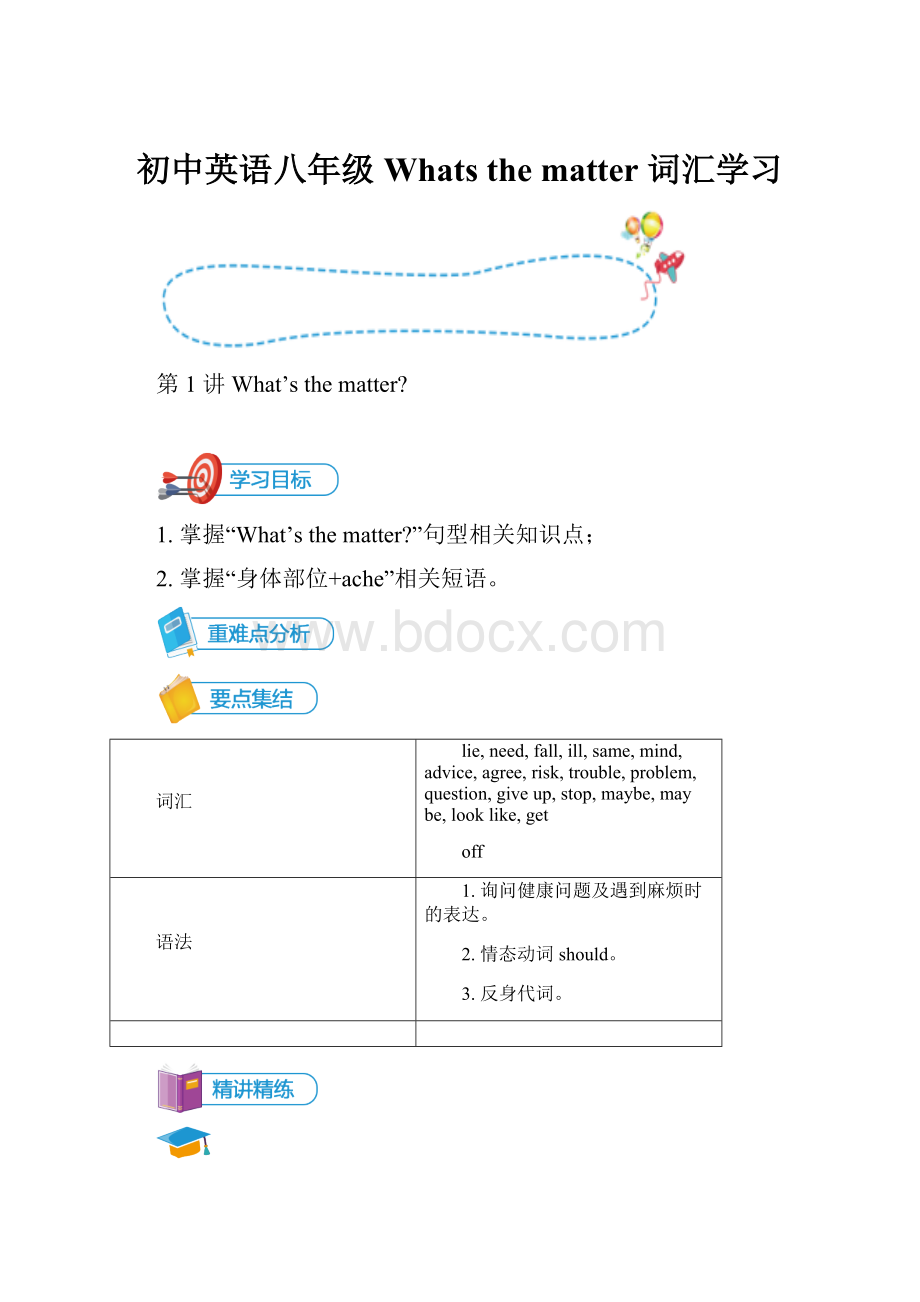初中英语八年级Whats the matter 词汇学习.docx
《初中英语八年级Whats the matter 词汇学习.docx》由会员分享,可在线阅读,更多相关《初中英语八年级Whats the matter 词汇学习.docx(28页珍藏版)》请在冰豆网上搜索。

初中英语八年级Whatsthematter词汇学习
第1讲What’sthematter?
1.掌握“What’sthematter?
”句型相关知识点;
2.掌握“身体部位+ache”相关短语。
词汇
lie,need,fall,ill,same,mind,advice,agree,risk,trouble,problem,question,giveup,stop,maybe,maybe,looklike,get
off
语法
1.询问健康问题及遇到麻烦时的表达。
2.情态动词should。
3.反身代词。
1.lie/lai/v.说谎;躺;下蛋
辨析
例句
(1)说谎:
lie-lied-lied-lying
Heliedabouthiscareer.
(2)躺;位于:
lie-lay-lain-lying
Theboylayinthesofa.
(3)拓展:
lay下蛋
lay-laid-laid-laying
Thehenlaidaneggyesterday.
2.need/nid/n./v.需要;要求
词性
用法
例句
情态动词
(1)need作情态动词无人称或数的变化,后接动词原形,多用于否定句和疑问句中。
Youneedn’tworry.
(2)由need引出的一般疑问句,肯定回答常用must或haveto;否定答语常用needn’t。
—NeedIanswerthequestion?
—Yes,youmust.(Yes,youhaveto.)
—No,youneedn’t.
(3)
由must引出的
—MustIdotheworknow?
—Yes,youmust/haveto.
—No,youneedn’t.(No,youdon’thaveto.)
一般疑问句,肯定回答用must,否定答语用needn’t或don’thaveto。
行为动词
(4)need作为行为动词有人称和数的变化,后面可接名词、代词、动名词及带to的动词不定式;可用于肯定句、疑问句和否定句中。
用法一:
sthneeddoing=sthneedtobedone
用法二:
sbneedtodosth
(1)Sheneedshelp.
(2)Theworkneedstobefinished.
(3)Ineedtofinishthework.
3.fall/fɔl/n./v.下降;跌下
辨析
例句
(1)v.fall-fell-fallen
落下,跌落
Didyoufalldown?
(2)falldown:
摔倒,强调“滑倒,摔倒”,指失去平衡而摔倒,后接宾语时,应加上介词from。
falloff:
指从某物上跌落下来。
Shefelldownfromthebike.
=Shefelloffthebike.
(3)fallinto:
落入
Theleaffellintotheriver.
(4)fallbehind:
落后
Youcan’tfallbehindyoursister.
(5)fallinlovewith:
爱上
Hefallsinlovewiththegirl.
(6)fallasleep:
入睡
Don’tcry,thesickhavefallenasleep.
4.mind/maɪnd/n./v.理智;介意
用法
例句
(1)doingsth.(动名词,用于mind的主语与doing的逻辑主语一致时)
Doyoumindopeningthewindow?
(2)mindsb.doingsth.(动名词的复合结构,用于mind的主语与doing的逻辑主语不一
致时)
Wouldyoumindhisplayingthecomputergameinyourroom?
(3)相关短语:
makeupone’smind:
下定决心nevermind:
不要紧
changeone’smind:
改变主意
Don’tchangeyourmind.
5.advice/ədˈvaɪs/n.建议;忠告
辨析
例句
(1)advice是不可数名词,可用some,much,alittle,apiece等修饰常用apieceofadvice:
一条建议
Therearetwopiecesofadvice.
(2)advise是动词,常用advise
sbtodosth.:
建议某人做某事。
Iadviseyoutobuytheclothes.
6.risk/rɪsk/n./vt.风险;冒...的危险
用法
例句
(1)risksbtodosth:
冒险去做某事
Don’triskthegirltodothisjob.
(2)riskdoingsth:
冒险做某事
Don’triskdisassemblingthemachineyourself.
(3)takearisk=takerisks:
冒险
Thegirltakesariskinthistest.
7.giveup/stop
辨析
例句
(1)giveup:
放弃该短语中,代词要放在中间,其用法有:
giveupdoingsth放弃做某事
Don’tgiveitup.
(2)stop:
阻止stopdoingsth=giveupdoingsth放弃做某事
Hestopsjoininghisfriendstoday.
8.looklike看起来像
感官动词+like,后接名词或名词性短语作表语
辨析
释义
(1)looklike
看起来像
(2)soundlike
听起来像
(3)feellike
摸起来像
(4)smelllike
闻起来像
(5)tastelike
尝起来像
1)询问健康问题及遇到麻烦时的表达
一、What’sthematter?
句型matter,名词,意为“问题;事情”,用于询问他人怎么了,可互换的短语如下:
What’sthematter(withsb)?
What’swrong(withsb)?
What’sthetrouble(withsb)?
/What’sone’strouble?
Whathappened(tosb)?
AreyouOK?
Isthereanythingwrong(withsb)?
二、要表达身体某一部位疼痛或不舒服
sb+have/has+身体部位-ache(headache/toothache…)Eg.Shehadastomachachelastnight.
sb+have/hasasore+身体部位Eg.Hehasasorethroat.
sb+hurt(s)+身体部位或反身代词Eg.Hehurthisleg.
sb+have/hasapaininone’s+身体部位Eg.Ihaveapaininmychest.
Thereissomethingwrongwithone’s+身体部位
Eg.Thereissomethingwrongwithmyrighteye.
拓展
havea/an+疾病名词“患……病”(cold/fever/cough)haveasorethroat患喉咙痛
haveasoreback患背痛haveafever发烧haveacold=catchacold患感冒
haveastomachache患胃痛haveatoothache患牙痛haveaheadache患头痛
haveabackache患背痛
二)情态动词should
Should是情态动词,意为“应该;应当”其后接动词原形,无人称和数的变化。
否定形式是在其后加not,缩写为shouldn’t,其疑问句是把should提到主语之前。
表示提出意见和建议Eg.Youshoulddrinklotsofwater.
表示义务和责任Eg.Weshouldstudyhard.
表示命令、责任或要求,语气比较强烈Eg.Youshouldn’tbesocareless.
表示推测和可能性Eg.Heshouldbeateacher.
用于主语为第一人称的疑问句中,表示征询意Eg.Shouldwetellheraboutit?
三)反身代词
反身代词是表示反射或强调自己的代词,意为“自己,本身”;为加强语气,常译为“亲自”。
1、反身代词的构成
第一人称、第二人称的反身代词由形容词性物主代词词尾self或selves构成,第三人称的反身代词由宾格词尾加self或selves构成。
如下表:
人称和数
第一人称
第二人称
第三人称
单数
myself
yourself
himselfherselfitself
复数
ourselves
yourselves
themselves
2、反身代词的用法
1 作宾语
Eg.
(1)Hefelldownandhurthimself.Weshouldtakegoodcareofourselves
2 作主语或宾语的同位语,加强语气
Eg.
(1)Youmustdoityourself.(主语同位语)
(2)Youmaygoandasktheteacherhimself.(宾语同位语)
(3)作表语Eg.Justbeyourself.
3、注意事项
第二人称反身代词在用时一定要根据句意确定用yourself还是yourselves。
Eg.Helpyourselvestosomefish,kids.(kids是复数,故用yourselves)
反身代词还常用在by之后表示“靠某人自己”。
Eg.Aronsavedhisownlifebyhimself.
第2讲I’llhelptocleanupthecityparks.
词汇
cleanup,cheerup,setup,fixup,callup,giveout,giveaway,giveup,putoff,putup,putaway,helpout,tryout,cometrue
语法
4.短语动词(runoutof,carefor,takecareof,takeafter,comeupwith)的用法。
5.动词不定式(decidetodosth,needtodosth,usedtodosth,helpsb(to)dosth,asksb.todosth,makeadifferenceto,
makeplanstodosth)的用法。
1、cleanup打扫(或清除)干净
用法
例句
(1)cleanup打扫(或清除)干净
Pleasecleanupthetoilet.
(2)cheerup(使)更高兴
HetriestocheerMumup.
(3)setup建起;设立
Hesetupthisuniversity.
(4)fixup修理
WherecanIfixmywatchup?
(5)callup给...打电话
Icalledyouuplastnight.
2、giveout分发;散发;用完,耗尽
用法
例句
(1)giveout分发;散发;用完,耗尽
Theteachergaveoutcandiesin10minutes.
(2)giveaway赠送;捐赠
Thepatientgavehisbodyawayafterhedied.
(3)giveup放弃
Thetaskistoodifficult,Ihavetogiveup.
3、putoff推迟
用法
例句
(1)putoff推迟
Theleaderputoffthesportsmeetingbecauseoftheweather.
(2)putup张贴;搭建;举起
Sheputupallthebaby’sphotosonthewall.
(3)putaway收起来,放好
Putawayallyourthingsinthetrain.
4、helpout帮助……摆脱困境
用法
例句
(1)helpout帮助……摆脱困境
HehelpedmeoutwhenIhaddifficulties.
(2)tryout参加选拔;试用
Iwantedtotrytheboatoutattheweekend.
(3)runoutof用光;耗尽
Thecarranoutofoil.
5、carefor照顾;非常喜欢
用法
例句
carefor照顾;非常喜欢
Helikesanimalsandcaresforthisrabbitverymuch.
Mumcaresforhimeveryday.
takecareof照顾;关怀
MyfatherisillandImusttakecareofhim.
6、takeafter…(外貌或行为)像
用法
例句
(1)takeafter(外貌或行为)像
HetakesafterhisDadverymuch.
(2)besimilarto与……相似
Thisbuildingissimilartothatone.
7、decidetodosth决定做某事
用法
例句
(1)decidetodosth决定做某事
HedecidedtogotoAmerica.
(2)needtodosth需要做某事
YouneedtostudyharderinEnglish.
(3)usedtodosth过去常常做某事
Theyusedtotakeawalkafterdinner.
8、helpsb(to)dosth帮助某人做某事
用法
例句
(1)helpsb.(to)dosth.帮助某人做某事
Hehelpedpoorpeoplefindjobs.
(1)asksb.todosth.要求某人做某事
Theteacheraskshimtofinishthehomeworktoday.
(2)asksb.nottodosth.要求某人(不要)做某事
Herparentsaskedhimnottosmoke.
9、comeupwith想出;提出(主意,计划)
用法
例句
comeupwith想出;提出(主意,计划)
Weneedtocomeupwithagoodplan.
10、makeadifferenceto对……产生影响;起作用
用法
例句
(1)makeadifferenceto
对……产生影响;起作用
TheCEOmakesadifferencetothecompany.
(2)makeplanstodosth制定计划做某事
TheymakeaplantovisitChinaonholiday.
(1)动词不定式
一、构成
动词不定式是“to+动词原形”,但有时是不带to的,其否定形式是在to前+not,即“nottodo”,动词不定式没有人称和数的变化,在句中不能做谓语。
二、用法
1.作宾语
后面常跟动词不定式做宾语的动词(词组)有:
want,hope,begin,learn,try,decide,forget,remember,like,love,expect,agree,refuse,wish,plan,afford,choose,wouldlike,need,start等,
Eg:
HebegantolearnEnglishattheageoffour.
另外:
有的及物动词要求跟复合宾语(即宾语+宾语补足语),如果其中的宾语是动词不定式短语,必须将形式宾语it放在宾语的位置上,而将动词不定式短语(真正的宾语)放在宾语补足语之后。
如:
IfinditusefultolearnEnglishwell.
【即学即练】needto,beginto,decideto
4.Wefinishallthehomeworktoday.
5.Shechoosethisjobbecauseitisnearherhome.
6.Theteacherteachafterallthestudentswereintheclassroom.
2.作宾语补足语
后面常跟动词不定式做宾语补足语的动词有:
ask,tell,want,expect,like,wish,wouldlike等,如:
HeaskedmetotalkaboutEnglishstudy.
【即学即练】ask,tell,want,wouldlike
1.Theboyisveryhungryandmetogivehimsomefood.
2.Myfriendmetofindjobinthewebsiteof58city.
3.Herfamilyhertostudyhistoryintheuniversity,butshedoesn’tlikeit.
4.you_togoouttoplaywithme?
3.作主语
动词不定式可以做主语,如:
Tomasteralanguageisnotaneasything.另外动词不定式做主语,可以放在后面,用it来做形式主语,真正的主语是动词不定式,如:
It’snecessarytofindthewitness.
【即学即练】important;dangerous;interesting
1.Itistoswimintheriver.
2.ItistostudyEnglishwellandwecanuseitinmanyfields.
3.
ItisformetotalkwithmyforeignfriendsinthecomputerandIlikeitverymuch.
第3讲Couldyoupleasecleanyourroom?
词汇
take,stay,infrontof,come,surprise,as...as,spend,finish,try,provide,neither,hate,make/let,borrow/lend,mind,
语法
情态动词could(can的过去式)的用法:
1、用来表示过去的能力、可能性或资格;
2、用来表推测或条件;
3、用来表示建议
4、用于表示试探性或礼貌性的请求。
1、take/teɪk/v.拿,采取,获得
用法
例句
(1)takeout意为“把带出去”
takeouttherubbish:
倒垃圾
Pleasetakeouttherubbishwhenyougoout.
(2)takeoff意为“脱下;起飞;请假”
Takeoffyourwetclothes.Whendidtheplanetakeoff?
Iwanttotakeadayoff.
(3)takedown意为“写下,记下”
Ididn’ttakedownhisphonenumber.
(4)takeup意为“开始从事;占用”
Iwanttotakeupwriting.TheworktookupallofSunday.
(5)takeaway
Pleasetaketherubbish
2、surprise/sə'praɪz/n.&v.惊奇,诧异
用法
例句
(1)insurprise意为“惊奇地”
Tomlookedatmeinsurprise.
(2)(takesb.)bysurprise
意为“(令某人)出其不意地...”
Howithappenswilltakeyoucompletelybysurprise.
(3)toone’ssurprise意为“使人吃惊的是”
Tooursurprise,theboywontheprize.
(4)surprise作及物动词意为“使吃惊”
:
surprisesb.
Hisprogresssurprisedme.
(5)拓展:
surpris